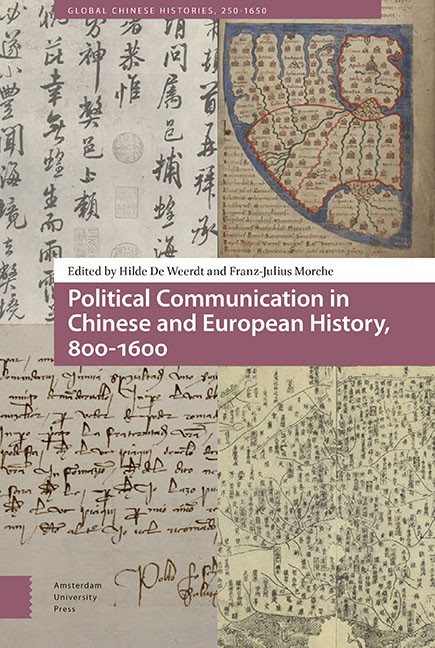Book contents
- Frontmatter
- Dedication
- Contents
- List of Figures and Tables by Chapter
- Acknowledgments
- Introduction
- Part I Communication and the Formation of Polities
- Part II Letters and Political Languages
- Part III Communication and Political Authority
- Part IV Memory and Political Imaginaries
- Epilogues
- List of Contributors
- Index
3 - Language and Political Communication in France and England (Twelfth to Fifteenth Centuries)
Published online by Cambridge University Press: 17 June 2021
- Frontmatter
- Dedication
- Contents
- List of Figures and Tables by Chapter
- Acknowledgments
- Introduction
- Part I Communication and the Formation of Polities
- Part II Letters and Political Languages
- Part III Communication and Political Authority
- Part IV Memory and Political Imaginaries
- Epilogues
- List of Contributors
- Index
Summary
Abstract
Symbolic power depends on the efficiency with which the values of any dominant group are transmitted to society at large. In the eleventh century, the Latin medieval Church initiated a fundamental transformation of the Western European symbolic communication system. In France and England, the symbolic power of the Gregorian Church was derived from the superiority of the spiritual power of the papacy. Its armies of monks and priests had to convince the members of the ecclesia (the Christian society) of the necessity to embark on the road to individual salvation under the guidance of the Church, imposing a new division between clergy and laity. Yet, whereas clericus and litteratus had earlier been synonymous, many lay people were now able to read and write. If the Church had developed its own administration and bureaucracy, the Gregorian educational and cultural revolution offered the same opportunity to cities and states, which thus acquired the capacity to govern by the written word. As the laity entered into an age of literacy, the foundations were laid for the genesis of a new type of state.
Keywords: England, France, communication system, vernacular, literacy, administrative state
Political anthropology has familiarized us with the idea that power is more firmly based upon consent than on pure strength: domination is more often accepted than imposed, and constraint is more a sign of weakness than of assertive confidence. Consent depends chiefly upon symbolic power, and symbolic power is entirely generated and managed by the communication system. Symbolic power is built on sets of values which have been described as ideology by Marx, but since this term has too often been used improperly and in rather simplistic ways, I prefer a term introduced by Maurice Godelier, which encompasses a much larger range of meanings: idéel, from idea, but not ideal, though the ideal is part of the idéel. The idéel is what is in the minds of all people in a given society, it is everything that is thought (either expressed through words or unformulated) or dreamed, what is called in French the imaginaire (which is both the act of imagining and what is being imagined) as well as the media through which it is conveyed and perceived.
- Type
- Chapter
- Information
- Publisher: Amsterdam University PressPrint publication year: 2021

